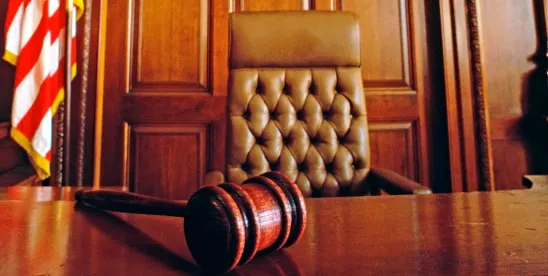Not all of the justices would put it that way. To be fair to the dissenters, and because his version is shorter, we’ll use Justice Thomas’s description of the underlying facts from his dissent in Williams v. Pennsylvania, 579 U.S. __ (2016), decided last Thursday.
Facts
Thirty-two years ago, Williams and his accomplice beat their victim to death with a tire iron and a socket wrench. Commonwealth v. Williams, 570 A.2d 75, 77-78 (Pa. 1990) (Williams I). Williams later returned to the scene of the crime, a cemetery, soaked the victim’s body in gasoline, and set it on fire. Id., 570 A.2d at 78. After the trial against Williams commenced, both the Chief of the Homicide Unit and the District Attorney, Ronald Castille, approved the trial prosecutor’s decision to seek the death penalty by signing a piece of paper. That was Castille’s only involvement in Williams’s criminal case. Thereafter, a Pennsylvania jury convicted Williams of first-degree murder, and he was sentenced to death. Williams I, 570 A.2d at 77. The Supreme Court of Pennsylvania affirmed his conviction and sentence. Id., 570 A.2d at 84.
Five years later, Williams filed his first petition for state postconviction relief. Commonwealth v. Williams, 863 A.2d 505, 509 (Pa. 2004) (Williams II). The postconviction court denied the petition. Id., 863 A.2d at 510. Williams appealed, raising 23 alleged errors. Ibid. The Supreme Court of Pennsylvania, which included Castille in his new capacity as a justice of that court, affirmed the denial of relief. Id., 863 A.2d at 523. . . . The court’s lengthy opinion did not mention the possibility of Castille’s bias, and Williams apparently never asked for his recusal. . . . Castille also presumably participated in [ruling on two later petitions for postconviction relief], but, again, Williams apparently did not ask for him to recuse. [In a] fourth attempt to vacate his sentence . . . , Williams alleged that the prosecution violated Brady v. Maryland, 373 U.S. 83 (1963), by failing to disclose exculpatory evidence. . . . The state postconviction court agreed and vacated his sentence. Commonwealth v. Williams, 105 A.3d 1237, 1239 (Pa. 2014) (Williams VI).
The Commonwealth appealed to the Supreme Court of Pennsylvania. Only then – the fourth time that Williams appeared before Castille – did Williams ask him to recuse. App. 181. Castille denied the recusal motion and declined to refer it to the full court. App. 171.
Williams v. Pennsylvania, No. 15-5040, at 2-4 (S. Ct. June 9, 2016) (Thomas, J. dissenting)
Justice Thomas didn’t mention that in a concurrence, Justice Castille “denounced what he perceived as the ‘obstructionist anti-death penalty agenda’ of Williams’s attorneys from the Federal Community Defender Office.” Slip Op. at 5.
Due Process
So, was Chief Justice Castille’s ruling in a case in which District Attorney Castille had once participated okay? Williams argued that it wasn’t, and that his ruling violated the Due Process Clause of the Fourteenth Amendment. The Court, speaking through Justice Kennedy, agreed. Here’s how it got there.
As the Court said, “[d]ue process guarantees ‘an absence of actual bias’ on the part of a judge.” Slip Op. at 6 (citing In re Murchison, 349 U.S. 133, 136 (1955)). In assessing that bias, “[t]he Court asks not whether a judge harbors an actual, subjective bias, but instead whether, as an objective matter, ‘the average judge in his position is ‘likely’ to be neutral, or whether there is an unconstitutional ‘potential for bias.’ ” Slip Op. at 6. This need for objective rules is heightened by a “complex criminal justice system, in which a single case may be litigated through multiple proceedings taking place over a period of years.” Slip Op. at 8. In that “large, impersonal system, an individual prosecutor might still have an influence that, while not so visible as . . . [a] one man grand jury, . . . is nevertheless significant.” Id. “In these circumstances, there remains a serious risk that a judge would be influence by an improper, if inadvertent, motive, to validate and preserve the result obtained through the adversary process.” Id.
With that scene set, was Castille’s authorization to seek the death penalty against Williams “significant, personal involvement in a critical trial decision”? The state called it a “brief administrative act,” Slip Op. at 9 and Justice Thomas said it amounted to “signing a piece of paper,” Thomas Dissent at 2. But the Court said that “whether to ask a jury to end the defendant’s life is one of the most serious discretionary decisions a prosecutor can be called upon to make.” Slip Op. at 9. The Court noted that in his re-election campaign for chief justice, multiple news outlets reported Castille’s statement that in his time as District Attorney, he “sent 45 people to death rows.” Slip Op. at 10. Justice Kennedy also pointed out that with multiple, intentional Brady violations alleged, “it would be difficult for a judge in [Castille’s] position not to view the [state postconviction] court’s findings as a criticism of his former office and, to some extent, of his own leadership and supervision as district attorney.” Id. The Court acknowledged that state ethical rules would cover many similar situations and noted that its due process analysis “demarks only the outer boundaries of judicial disqualifications.” Id.
Harmless Error?
Finally, the Court asked whether Williams was entitled to relief due to Castille’s participation in the post-conviction ruling against him. A non-crazy answer is no, that because Chief Justice Castille didn’t cast a deciding vote in the matter, that the Supreme Court of Pennsylvania would have come out the same way regardless. The Court’s opinion did not find that reasoning persuasive. An appellate court’s confidential deliberations made it “neither possible nor productive to inquire whether the jurist in question might have influenced the views of his or her colleagues during the decisionmaking process.” Slip Op. at 12. “The fact that the interested judge’s vote was not dispositive may mean only that the judge was successful in persuading most members of the court to accept his or her position.” Slip Op. at 13. And last, “[b]oth the appearance and reality of impartial justice are necessary to the public legitimacy of judicial pronouncements . . . .” Id.
What it Means
Going forward, criminal defense counsel should keep a judge’s prior participation in the prosecution – even long ago – in mind, and be prepared to move for recusal promptly if it arises. Williams’s counsel’s delay on that score gave the dissenters unnecessary ammunition against him. Also, “significant, personal involvement in a critical trial decision” might be less significant and involved than you think. Watch out.




 />i
/>i

